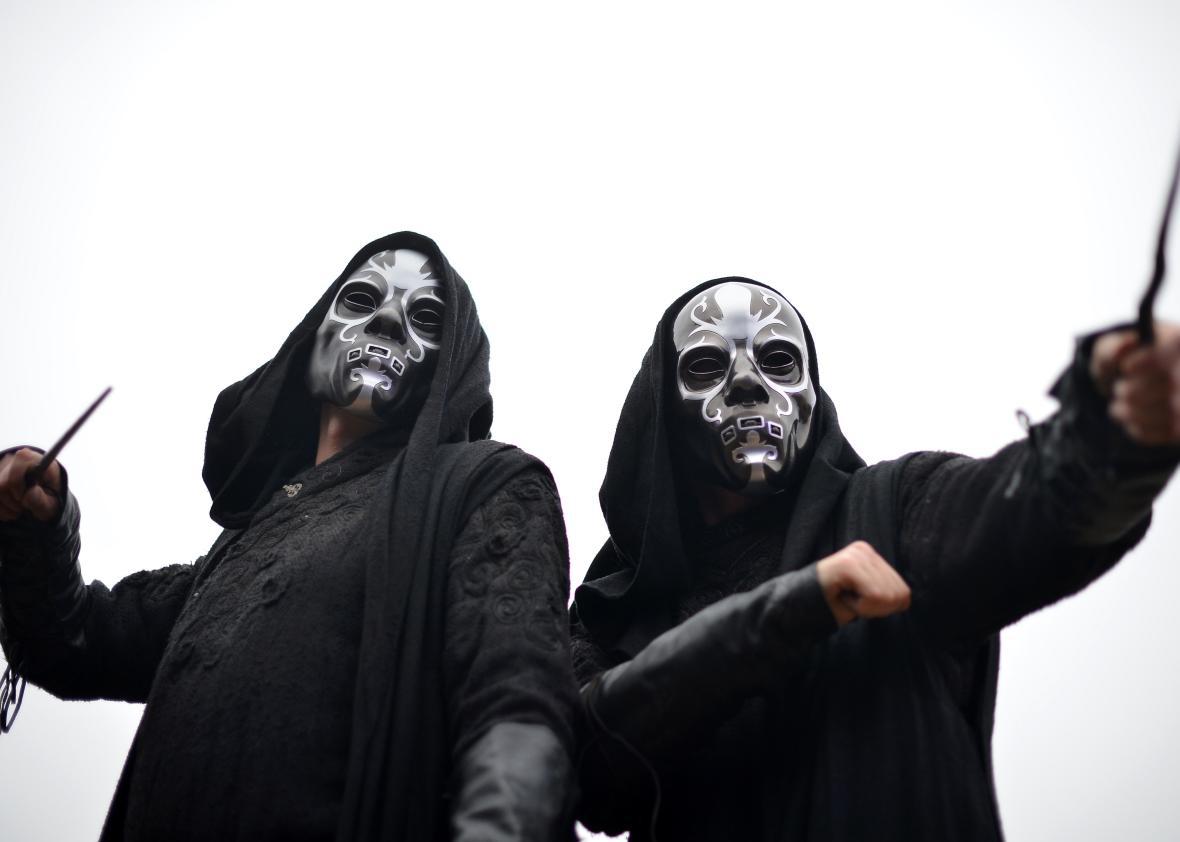Bad news, fellow Slytherins, we’ve been pronouncing the Dark Lord’s name wrong. It’s not Vol-deh-mort, with a t at the end. It’s Vol-deh-mor. The final consonant is silent, as in the French word for death, mort, which is pronounced like the purple wilderness in which Heathcliff hanged puppies long ago.
J.K. Rowling confirmed our mass delusion Wednesday in a tweet.
And, as the Daily Dot points out:
Her Highness has actually mentioned the pronunciation issue before, in earlier interviews that predate the movies. Apparently by the time the first film came out in 2001, she’d given up the battle and let the fans decide Voldemor(t)’s linguistic fate.
The man (?) himself weighed in five years ago, to no avail.
Like those naive fools in the Ministry of Magic, we persisted under a fond dream—in our case, the dream that the most frequently mangled name in the Harry Potter universe was Hermione’s. (Her-mee-own? Hermy-own-ninny?) I cannot decide whether the sharp, guillotine-like strike of the t makes Voldemort scarier, or lessens Vol-deh-mor’s haunted, desolate emptiness. But it doesn’t matter. Now we know the real reason why He Must Not Be Named. Because Nobody Knows How.
And yet a whole ‘nother billow of riddles surrounds Tom Riddle’s adopted alias. What exactly does Voldemort mean? James Harbeck has written about how the syllable “mor” lends itself to “melancholy, darkness, and villainy.” He calls it a phonestheme, a word part that suggests certain feelings not by virtue of etymology or definition, but through association. (Another example: “gl” words often pertain to glittering, glimmering, glassy, glowing, glistening light.) Sonically, Voldemort evokes “molder,” a necrotic verb linked to decay and unwholesomeness. It doubles up on the mysterious “oh” sound, its two four-letter blocks—vold and mort—arrayed around the e in fearful symmetry.
If you believe that Riddle fashioned his stage name from French spare parts, you might translate Voldemort as “flight of death” or “flight from death.” This seems right: The Dark Lord is both an instrument or agent of mortality and someone who fears it terribly. In a 2006 interview, Rowling said that “Voldemort’s fear is death, ignominious death. … He thinks that it’s a shameful human weakness.” He Who Must Not Be (Incorrectly) Named spends most of Harry Potter fleeing the end, whether by entrusting his soul to horcruxes or pursuing the annihilation of any conceivable threat.
But “vol” in French can also mean “theft.” Is Voldemort the “thief of death,” in that he not only stole away from Death when Death sought him, but stole from Death what was Death’s due? Perhaps Rowling means to echo the tale of the three brothers, a legend told to wizard children in the Harry Potter universe, about men who vainly scheme to evade the Grim Reaper.
Or does the “vol” in question really derive from the Latin root for “will”? (Think “volunteer,” a willing donator of time, or “malevolent,” someone who intends evil things.) If we translate Voldemort as “the wish to die” or “the wish for death,” perhaps it is possible to interpret all of Harry Potter as an allegory for the hero’s struggle against depression in the wake of his parents’ murder. (Such a reading would certainly explain the Dementors.)
Or MAYBE J.K. Rowling read Antoine de Saint-Exupéry’s book Vol de Nuit for her French A Level. (Our own June Thomas did.) The novel, about an airmail pilot sent to his death by an unscrupulous boss, is shot through with the hero’s terrifying premonitions of mortality.
One thing is for sure: If the Dark Lord had spent less time on wordplay and more on securing the safety of his horcruxes, he might be alive today to tell us how to pronounce his name.
